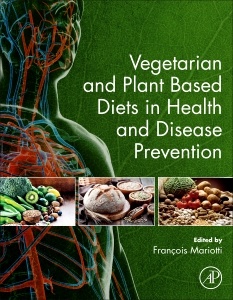Vegetarian and Plant-Based Diets in Health and Disease Prevention
Coordonnateur : Mariotti François

Vegetarian and Plant-Based Diets in Health and Disease Prevention examines the science of vegetarian and plant-based diets and their nutritional impact on human health. This book assembles the science related to vegetarian and plant-based diets in a comprehensive, balanced, single reference that discusses both the overall benefits of plant-based diets on health and the risk of disease and issues concerning the status in certain nutrients of the individuals, while providing overall consideration to the entire spectrum of vegetarian diets.
Broken into five sections, the first provides a general overview of vegetarian / plant-based diets so that readers have a foundational understanding of the topic. Dietary choices and their relation with nutritional transition and sustainability issues are discussed. The second and third sections provide a comprehensive description of the relationship between plant-based diets and health and disease prevention. The fourth section provides a deeper look into how the relationship between plant-based diets and health and disease prevention may differ in populations with different age or physiological status. The fifth and final section of the book details the nutrients and substances whose intakes are related to the proportions of plant or animal products in the diet.
1. Occasional meat eaters, vegetarians, lacto-ovo-vegetarians, vegans, omnivores, pescetarians, and other dietary descriptors 2. The importance of lifestyle in vegans and vegetarians: Smoking, alcohol, exercise and other variables. 3. Barriers to increasing plant protein consumption in Western populations 4. Attitudes toward meat and plants in vegetarians 5. Religious variations: vegetarian diets and impact on health status of children 6. Nutrition knowledge of vegetarians 7. Vegetarianism and eating disorders 8. Bran function in vegetarians 9. Geographical aspects of vegetarianism: Vegetarianism in Taiwan 10. Geographical aspects of vegetarianism: Vegetarians in India 11. Dietary transition: Long term trends, animal vs plant energy intake and sustainability issues 12. Plant based diets for mitigating climate change 13. Dietary patterns of plant-based, vegetarian and omnivorous diets 14. Meat consumption and health outcomes 15. Fruits and vegetables intake and disease risk 16. Whole grains and cardiovascular health 17. Nut intake and health 18. Protective components in dietary plants based foods 19. Blood pressure and vegetarian diets 20. Bone health and vegan diets 21. Vegetarian diets and Mood 22. Cancer risk and plant based diets 23. Faecal microbiota and the vegetarian diet 24. Asthma and raw vegetable diets 25. Vegetarian diets, insulin sensitivity and the risk of diabetes 26. Vegetarian diets in people with type-2 diabetes 27. Ischemic heart disease in vegetarians and non-vegetarians 28. Defecation and stools in vegetarians: implications for health 29. Reflux esophagitis and vegetarianism 30. Weight maintenance and weight loss: the adoption of diets based on predominantly plants 31. Vegetarian infants and complementary feeding 32. Nutritional status of vegetarian children 33. Food and meals in vegetarian children and adolescents 34. Vegetarian diets in pregnancy 35. Nutritional profiles of vegetarian menopausal women 36. Nutritional profiles of vegetarian elderly 37. Plant protein, animal protein and protein quality 38. Plant protein, animal protein and cardiometabolic health 39. Vegetarian diet and Zinc status 40. Plant-based diets and Iron status 41. Plant-based diets and Selenium intake and status 42. Vitamin B12 deficiency in vegetarians 43. B Vitamins intake and plasma homocysteine in vegetarians 44. Iodine deficiency, thyroid function and vegetarianism 45. Polyunsaturated fatty acids status in vegetarians 46. Probiotics in nondairy products 47. Dietary exposure to chemicals in vegetarians
- Discusses the links between health and certain important characteristics of plant-based diets at the level of food groups
- Analyzes the relation between plant-based diet and health at the different nutritional levels, i.e. from dietary patterns to specific nutrients and substances
- Provides a balanced evidence-based approach to analyze the positive and negative aspects of vegetarianism
- Addresses the different aspects of diets predominantly based on plants, including geographical and cultural variations of vegetarianism
Date de parution : 05-2017
Ouvrage de 922 p.
19x23.3 cm
